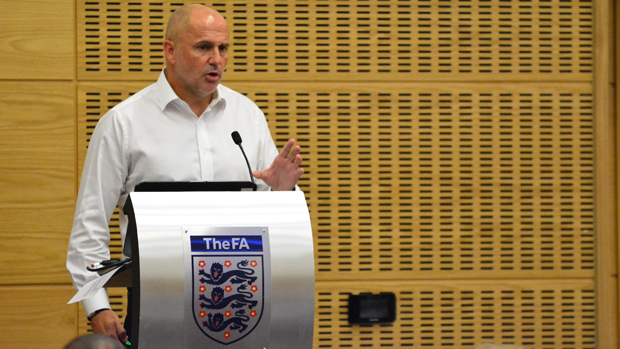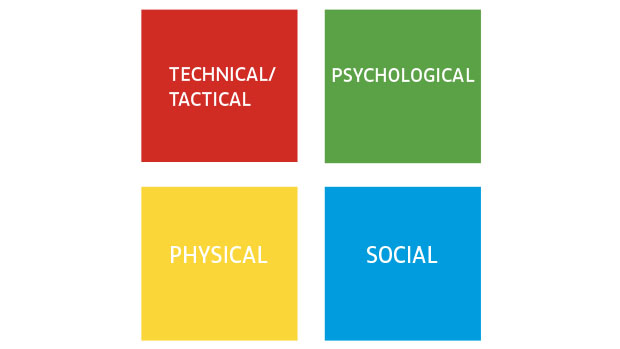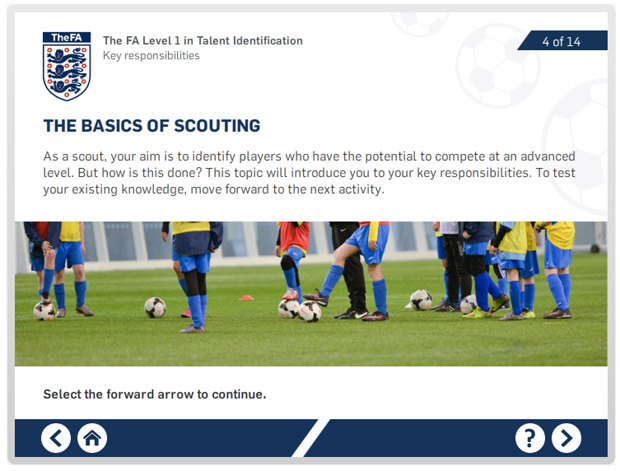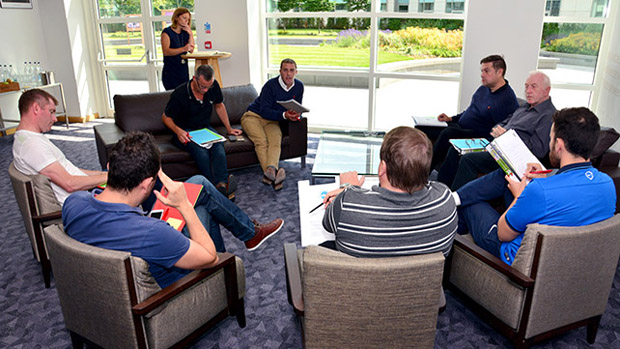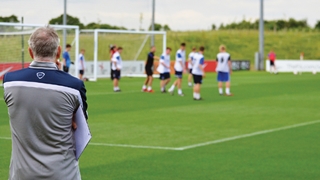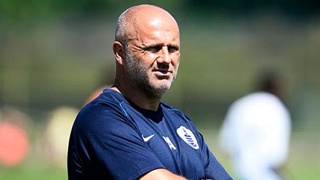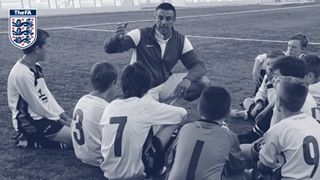
Richard Allen, The FA’s Head of Talent Identification, tells a story about how a young player was hastily labelled as ‘mentally weak’ by some in the professional game.
The reason: the young player was at a European tournament and was continually in tears. Missing home and wanting to see his parents, he clearly didn’t meet the professional prerequisites set by some. The player in question was seven years old.
Fast forward ten years. The same seven year-old was busy registering a stand-out performance for England U17s against Belgium at St George’s Park last month. Although his journey to becoming a professional is still uncertain, the opportunity is still alive. What the story highlights is the precarious nature of retain or release decisions made on players at the very youngest ages.
It also raises an important question as to the rationale used by those making such decisions.
Allen, who spent eight years as head of recruitment at Tottenham Hotspur as well as a spell as QPR’s academy director before joining The FA in 2014, believes there is need for much more patience with young players and a greater understanding of each individual. One-size simply doesn’t fit all.
“Research shows you should have a wide pool of players, keep them in a positive development system as long as possible and you might start to have some success,” he explains.
“As soon as you start to say, ‘we only want ten U6s’ then you’re going to miss out on a vast amount of players. Of course, I understand that most grassroots clubs, and even professional clubs, have a limited amount of resources and have to run a team. But if you think that this approach will lead to finding talented players for the future then I think it’s misguided,” adds Allen.
For all the trial matches and time spent identifying talent in the Primary School age category, Allen presents the sobering statistics, released by the Premier League, that only 0.5% of those signed by a professional club aged U9 will go all the way through to play in the club’s first-team.
“There is a move from professional clubs to selecting far more players – from a much wider pool – and hopefully they have taken into account a range of factors including: relative age effect, maturation and that each child is very different.
“A lot of our work at The FA is looking at the right hand side of the FA Four Corner Model and the importance of the psychological and social corners and what they may look like at different ages and stages on the journey and how this might impact the decision-making of adults,” explains Allen.
For many years the identification of footballers has been based on the hunch of a scout ‘with a good eye’; in many cases a willing amateur who has been doing the job for years. And although Allen is quick to stress that experience and intuition are still hugely valuable parts of the process, he admits the industry has, in many ways, had a ‘back of a fag packet’ approach for far too long.
Whereas support for coaches has changed significantly over the last decade, the support for those selecting the players has been limited.
Over the last two years, Allen and his team of talent identification staff have worked to address this. A suite of courses across five levels has been designed to help educate those involved in selecting players at the grassroots through to the hugely-influential heads of recruitment and technical directors in charge of multi-million pound player transfer strategies.
The new Level 2 and Level 4 courses are already up and running, with the new Level 1 set to be launched soon. One consistent throughout all the course content is an emphasis on evidence, analysis and research. The talent identifier of the future will be one who can marry both ‘art and science,’ says Allen.
The new Level 2 course – involving 16 hours of learning – is aimed at professional scouts within clubs. The course covers modules on: ethics and values, methodology and player profiling.
25 heads of recruitment, including Everton’s Steve Walsh, Wolves’ Kevin Thelwell, Stoke City’s Mark Cartwright and Chelsea’s Jim Fraser, have all completed the pilot of the Level 4 course – working through modules on leadership, strategy, how to negotiate for players and how to run a multi-complex department. The group will be invited back to present on future courses.
“In the old days ‘recruitment’ in professional clubs was a few part-time people and not much money. Now it’s a big operation for the big clubs with big budgets,” Allen explains.
The Level 1 will be an accessible hour-long online course designed for those working in grassroots football and provides an introduction to some of the basic concepts of Talent ID – such as the difference between performance and potential.
“The dangers of only looking at performance means you are identifying players that are effective now but perhaps won’t be as effective in the future,” explains Allen.
“We have to make sure that we’re looking beyond that and trying to think what a player might look like in the future and where their potential lies.”
It is an issue which not only applies to the youngest players at grassroots level, but all those involved in the game at every level. Quite often the pressure for gaining results and winning muddy the individual development process.
“In my mind, the only result that counts is the first-team game. Every age-group leading up to that is a developmental process and should be about the individual,” stresses Allen.
“Along the way you may even set up the team to achieve different development goals – and know that if you do you may risk losing as a result. Chris Ramsey, who I worked with at Tottenham Hotspur’s academy, was fantastic at doing that. He would say: full-backs don’t come back, keep pushing on, our defenders have to defend 1v1 at the back. It would also mean 1v1 in attacking areas and other parts of the pitch.
“So you’re exposing individuals to problems which sometimes they’re going to get wrong because they are kids. They might lose the game but the learning benefits can be huge,” he adds.
Allen hopes that by educating from the grassroots up there will be an improvement all the way through to the talent identification process involved in the England set-up.
“If we can influence parents, teachers and those who select the Sunday morning sides, then we will see a benefit all the way through.
“The professional club scouts are already picking from a pre-selected group, so if we can improve every layer of the process by the time the national scouts are attending games, you would hope the quality of players are of a much better level and fit within our profiles and standards for national players,” Allen explains.
The elephant in the room during the discussion is the reality that professional clubs are renowned for being closed operations when it comes to sharing secrets of recruitment. Culturally and traditionally, discussing scouting approaches is an alien concept and goes against the idea of educational courses based on sharing of ideas and discussion. Allen explains that huge strides have been made.
“On the Level 4 we will use lots of experts from outside of football – such as for the negotiation aspect of the course – it’s not all led by The FA. We have independent experts who work with businesses who come in to facilitate the workshops. It helps create a different environment where the focus isn’t always on football issues.
“As a result on our recent Level 4 course there was an openness and a definite shift towards talking about problems and helping each other solve similar issues. It’s a knowledge sharing environment; as much as you give, you get back,” explains Allen.
As well as the courses held at St George’s Park, there have been a series of regional events including a number of Asians in Football events –helping open up the recently developed content to new audiences.
A pilot for the Level 5 course - created for Technical Directors - led by Dan Ashworth, FA Technical Director, and Allen is also in the pipeline.
“We have come a long way in a short period of time and there is a great demand for the courses,” explains Allen.
“Clubs are now desperate for The FA to provide bespoke workshops for staff – and not just some of the lesser resourced clubs. In the same way that FA Youth Coach Developer staff go in to support the coaches – the professional clubs want the support on the Talent ID and recruitment side,” he adds.
Click here to learn more about The FA’s Talent Identification courses and sign-up for a course.


